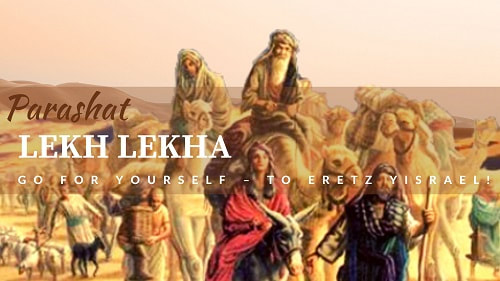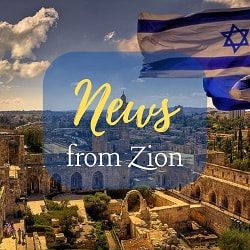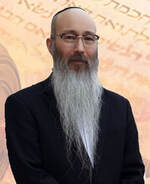|
By: HaRav Menashe Sasson Reporting from Jerusalem, Israel Published in the U.S.A. Every Parashat of the Torah is just as important as every other. Parashat Lekh-Lekha, however, might properly be described as “one of the first, among equals.” Parashat Lekh-Lekha begins:
Bereshit 12:1-3. As an initial matter, it is important to the understanding of a text to view the text as a whole, and to not merely “cherry-pick” portions of the text and then attempt to understand the text through the “lens” of the “cherry-picked” phrase or section. It is from this perspective of Lekh-Lekha that we begin our analysis. In the first words of the first sentence of Parasha Lekh-Lekha, HaShem tells Abram, whose name HaShem will later change to “Abraham,” to “Go for yourself” to Eretz Yisra’el. From time immemorial, Jews living in galut [גלות] (exile) have been subjected to pogroms and expulsions. When HaShem told Abram to “Go for yourself” to Eretz Yisra’el, he was telling not just Abram, but the whole of the Jewish people for all generations, that Eretz Yisra’el is the eternal home of not just the Jewish people, but also of the Jewish nation. In other words, “Go for yourself” to the home HaShem has selected and given to the Jewish people and to what will become the Jewish nation. This understanding leads to the next idea which is expressed in the opening lines of Parashat Lekh-Lekha, that the benefits of Jews living in the Jewish Homeland accrue not only to the Jewish people, but also to the other nations of the world. The second half of this first paragraph of Parsha Lekh-Lekha starts with the pasuk [פסוק] (verse) “And I will make you [the Jewish people] a great nation.” This, of course, requires us to define what it is to be “a nation,” as well as what it means to be “a great nation.” A “nation” is defined as a people who are, first and foremost, “sovereign,” that is, who have the legal right and ability to made and enforce laws, and who are not subject to the law of any other nation (save, perhaps, for international law). A “great nation” is often defined as a nation which possesses such things as “wealth,” “military power and strength,” and the like. These characteristics, however, are merely attributes of greatness, but do not, standing alone, made a nation “great.” What makes a nation “great” is having influence over other nations and peoples. Turning to Medinat Yisra’el (the modern-day state of Israel), we see that although the Medinat is a sovereign nation, it is not yet a “great nation.” Although the Medinat has extraordinary potential, it is currently far short of achieving that potential. Geographically, Medinat Yisra’el is a tiny country, which is “treading water” in the middle of a “sea” of hostile Arab countries. Not only is the Medinat surrounded by hostile Arab countries, the Medinat itself is populated by a large Arab population which is hostile to its very existence. The Medinat does, however, have a large and strong benefactor which is the United States. Although the United States professes a commitment to the security of the Medinat, that commitment is often contingent, implicitly, if not explicitly, on the Medinat doing, or refraining from doing, what Uncle Sam tells it to do or not do. This, of course, is hardly an example of Jewish national greatness. In the words of Tanakh, none other than HaShem himself intends that Medinat Yisra’el become “a light unto the nations; to open blind eyes. . . .” Yesha’yahu 42:6. So, the question remains: How can Medinat Yisra’el become a “great nation,” as opposed to merely being another “nation” among the many nations? That is, what must Medinat Yisra’el do to become a nation which influences other nations”? Before we answer this question, let us look at what HaShem promises if, collectively, the Jewish people, as commanded, do in fact: “Go for [themselves]” to Eretz Yisra’el. The opening paragraph of Parashat Lekh-Lekha continues: “I will bless those who bless you, and he who curses you I will curse.” This pasuk [פסוק] (verse) is commonly “cherry-picked” and recited in isolation from the pasukim [פסוקים] (verses) which surround it. The result is that this pasuk [פסוק] (verse) is taken out of context to imply that HaShem will bless the Jewish people and curse their enemies without regard to where, geographically, the Jewish people may happen to be found at any given point in time. However, taken in its proper context, the pasuk [פסוק] (verse) means that the stated blessing and curse is contingent upon the Jewish people going “for yourself from your land, from your relatives, and from your father’s house to [Eretz Yisra’el, where HaShem] will make [the Jewish people] a great nation.” The opening paragraph of Parashat Lekh concludes: “and all the families of the earth shall bless themselves by you.” In other words, if the Jewish people “Go for [themselves] to Eretz Yisra’el, HaShem will bless them, make them a great nation who will be a blessing, and protect them. Then, as a consequence of all this, “all the families of the earth shall bless themselves by [the Jewish people]. Ever since its founding in 1948, Medinat Yisra’el, rather than being a safe-haven to which any Jew in galut [גלות] (exile) could flee to for safety, has been – and continues to be to this day – the country where, each year, more Jews are assaulted and/or killed, simply because they are Jewish, both per capita and in absolute numbers, as compared with any other country in the world. It's bad enough to be the country with the highest rate of antisemitism in the world; it’s even worse when that country is the only “Jewish state” in the world. Clearly, then, despite Jews being in control of the only “Jewish state” in the world and notwithstanding significant numbers of Jews who, since 1948, have made Aliyah [עליה] (immigrated to Israel), the Medinat is not yet, as HaShem promised, a “great nation.” However, the failure of Medinat Yisra’el to become a “great nation” is not attributable to HaShem; rather, as difficult as this may be for some to accept, the fault lies solely with us, with the Jewish people. Medinat Yisra’el was established, in 1948, out of the ashes of the Shoah [שואה] (Holocaust). When the Medinat’s enemies attacked – on numerous occasions – HaShem repeatedly blessed the Medinat not merely with survival, but with military success that was beyond almost everyone’s wildest dreams. HaShem has – and continues – to do His part. We, the Jewish people, however, are coming up short. To be the “great nation” that is envisioned by the Torah, in general, and by Parashat Lekh-Lekha, in particular, means to be a “Jewish state.” One might object that Medinat Yisra’el is – and has, since its inception in 1948, been – a Jewish state. After all, Israel’s “Basic Law” declares the Medinat to be a “Jewish state.” However, when the Torah speaks of Medinat Yisra’el being a “great nation,” that is, a great Jewish state, it does not mean a state which is governed by non-Jewish law, a state which is governed by “secular” Jews, or worse, a state which is governed by non-Jews. It is only when the Jewish people – as a nation – are living in, and in control of, their land – Eretz Yisra’el – and living a Torah-observant life therein, that the Jewish nation will be a blessing – a light unto – the other nations of the world. It is then that HaShem will “bless those who bless [the Jewish people], and he who curses [the Jewish people, HaShem] will curse; and all the families of the earth shall bless themselves by [the Jewish people].” As we learn from the plain language of the pasuk [פסוק] (verse) – as well as from history – the command that Abraham and Sarah – and their descendants – go “to the land [Eretz Yisra’el] that [HaShem] will show you. . . .” was not intended solely for the benefit of the other nations of the world. Rather, HaShem’s command that Jews make Aliyah [עליה] was to “Go for yourself” [לך לך] (Lekh-Lekha) – to make Aliyah “for yourself,” not for the benefit of others. In other words, HaShem is telling each and every Jew that it is in his or her best interest to make Aliyah [עליה] – that is, to not remain in the lands outside of Eretz Yisra’el [חוץ לארץ]. In other words, it is by doing what is in the best interest of every Jew – Going for yourself to Eretz Yisra’el – that you can secure all the blessings promised by HaShem. And, in doing so, you will be able to live a religious life and influence the direction of the Medinat, and thereby contribute to Medinat Yisra’el becoming a “great nation,” a “Light unto the nations.” May you, dear Jew, be blessed to “Go for Yourself,” to make Aliyah, to go up to Eretz Yisra’el, the Land HaShem gave you as an inheritance. שבת שלום Shabbat Shalom! Copyright © The Israel Foundation. All Rights Reserved.
0 Comments
Your comment will be posted after it is approved.
Leave a Reply. |
THE ISRAEL FOUNDATION





